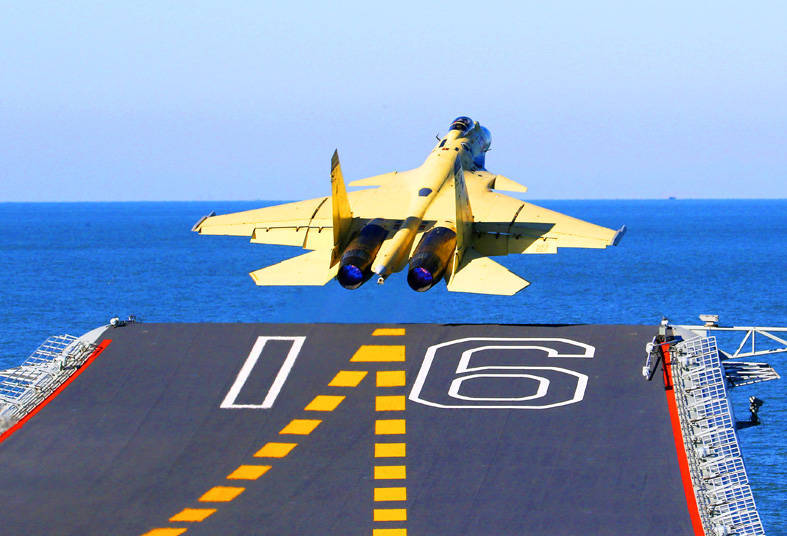《TAIPEI TIMES》 New Chinese maritime law could be ‘time bomb’

A Chinese People’s Liberation Army Navy Shenyang J-15 takes off from the Liaoning aircraft carrier in an undated photograph. Photo: AP
By Kayleigh Madjar / Staff writer, with CNA
From tomorrow, China legally requires foreign vessels entering what it considers to be its territorial waters to notify Beijing, creating what some fear is a “ticking time bomb” for conflict in the South China Sea.
The Standing Committee of the National People’s Congress in April amended China’s Maritime Traffic Safety Law (海上交通安全法) to require all foreign vessels entering Chinese territorial waters to inform maritime authorities, carry relevant permits, and submit to Chinese command and supervision.
It also gives Beijing the authority to instruct foreign vessels that “threaten the safety of Chinese internal or territorial waters” to leave and to exercise the “right of immediate pursuit.”
According to the UN Convention on the Law of the Sea, territorial waters are defined as the 12 nautical miles (22.2km) of sea extending from terrestrial territory, with the “right of innocent passage” reserved for vessels moving through territorial waters in a manner that does not threaten the security of the coastal state.
The Chinese Maritime Safety Administration said in a statement that the new reporting requirement would apply to all submersibles, nuclear vessels and ships carrying radioactive or harmful substances, as well as any foreign vessels deemed to “endanger the maritime traffic safety of China.”
Reports should include the vessel’s name, call sign, current position, next port of call, estimated course and speed, nature of goods and loading capacity, it said.
Other nations are afraid that China’s exploitation of the law to expand the scope of “gray zone” conflict could become a ticking time bomb, said Su Tzu-yun (蘇紫雲), director of the Division of Defense Strategy and Resources at the Institute of National Defense and Strategic Research.
Beijing considers its maritime jurisdiction to encompass more than just its coastal waters, Su said.
This would include the 12 nautical miles of sea surrounding the artificial reefs it has constructed in the South China Sea, giving Beijing an excuse to respond to freedom of navigation exercises carried out by other nations, he said.
Taiwan Democracy Watch specialist Sung Cheng-en (宋承恩) said that he expects the impact on the Taiwan Strait to be slight.
Under the UN convention, waters between Taiwan and China are considered an international strait through which freedom of navigation “solely for the purpose of continuous and expeditious transit of the strait” is guaranteed.
However, Sung agreed that the amendment could affect US operations in the South China Sea, depending on how China’s coast guard chooses to enforce the law.
新聞來源:TAIPEI TIMES

















